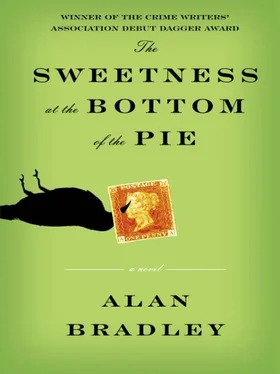Alan Bradley - The Sweetness at the Bottom of the Pie
Здесь есть возможность читать онлайн «Alan Bradley - The Sweetness at the Bottom of the Pie» весь текст электронной книги совершенно бесплатно (целиком полную версию без сокращений). В некоторых случаях можно слушать аудио, скачать через торрент в формате fb2 и присутствует краткое содержание. Жанр: Старинная литература, на английском языке. Описание произведения, (предисловие) а так же отзывы посетителей доступны на портале библиотеки ЛибКат.
- Название:The Sweetness at the Bottom of the Pie
- Автор:
- Жанр:
- Год:неизвестен
- ISBN:нет данных
- Рейтинг книги:3 / 5. Голосов: 1
-
Избранное:Добавить в избранное
- Отзывы:
-
Ваша оценка:
- 60
- 1
- 2
- 3
- 4
- 5
The Sweetness at the Bottom of the Pie: краткое содержание, описание и аннотация
Предлагаем к чтению аннотацию, описание, краткое содержание или предисловие (зависит от того, что написал сам автор книги «The Sweetness at the Bottom of the Pie»). Если вы не нашли необходимую информацию о книге — напишите в комментариях, мы постараемся отыскать её.
The Sweetness at the Bottom of the Pie — читать онлайн бесплатно полную книгу (весь текст) целиком
Ниже представлен текст книги, разбитый по страницам. Система сохранения места последней прочитанной страницы, позволяет с удобством читать онлайн бесплатно книгу «The Sweetness at the Bottom of the Pie», без необходимости каждый раз заново искать на чём Вы остановились. Поставьте закладку, и сможете в любой момент перейти на страницу, на которой закончили чтение.
Интервал:
Закладка:
Mrs. Mullet, scurrying by on her way to the kitchen, stopped to put a solicitous hand on my arm.
"Was the pie good, luv?" she asked.
I'd forgotten the pie until that moment. I took a leaf from Dr. Darby's notebook.
"Um," I said.
Inspector Hewitt and Dr. Darby had returned to the garden when I climbed slowly up the stairs to my laboratory. I watched from the window with a little sadness and almost a touch of loss as two ambulance attendants came round the side of the house and began to shift the stranger's remains onto a canvas stretcher. In the distance, Dogger was working his way round the Balaclava fountain on the east lawn, busily decapitating more of the Lady Hillingdons.
Everyone was occupied; with any luck, I could do what I needed to do and be back before anyone even realized I was gone.
I slipped downstairs and out the front door, pulled Gladys, my ancient BSA, from where she was leaning against a stone urn, and minutes later was pedaling furiously into Bishop's Lacey.
What was the name Father had mentioned?
Twining. That was it. “Old Cuppa.” And I knew precisely where to find him.
5
BISHOP LACEY'S FREE LIBRARY WAS LOCATED IN COW Lane, a narrow, shady, tree-lined track that sloped from the High Street down to the river. The original building was a modest Georgian house of black brick, whose photograph had once appeared in color on the cover of Country Life . It had been given to the people of Bishop's Lacey by Lord Margate, a local boy who had made good (as plain old Adrian Chipping) and had gone on to fame and fortune as the sole purveyor of BeefChips, a tinned bully beef of his own invention, to Her Majesty's Government during the Boer War.
The library had existed as an oasis of silence until 1939. Then, while closed for renovations, it had taken fire when a pile of painter's rags spontaneously combusted just as Mr. Chamberlain was delivering to the British people his famous “As long as war has not begun, there is always hope that it may be prevented” speech. Since the entire adult population of Bishop's Lacey had been huddled round one another's wireless sets, no one, including the six members of the volunteer fire department, had spotted the blaze until it was far too late. By the time they arrived with their hand-operated pumping engine, nothing remained of the place but a pile of hot ashes. Fortunately, all of the books had escaped, having been stored for protection in temporary quarters.
But with the outbreak of war then, and the general fatigue since the Armistice, the original building had never been replaced. Its site was now nothing more than a weed-infested patch in Cater Street, just round the corner from the Thirteen Drakes. The property, having been given in perpetuity to the villagers of Bishop's Lacey, could not be sold, and the once-temporary premises that housed its holdings had now become the Free Library's permanent home in Cow Lane.
As I turned off the High Street, I could see the library, a low box of glass-brick and tile, which had been erected in the 1920s to house a motorcar showroom. Several of the original enamel signs bearing the names of extinct motorcars, such as the Wolseley and the Sheffield-Simplex, were still attached to one of its walls below the roofline, too high up to have attracted the attention of thieves or vandals.
Now, a quarter century after the last Lagonda had rolled out of its doors, the building had fallen, like old crockery in the servant's quarters, into a kind of chipped and broken decrepitude.
Behind and beyond the library, a warren of decaying outbuildings, like tombstones clustered round a country church, subsided into the long grass between the old showroom and the abandoned towpath that followed the river. Several of these dirt-floored hovels housed the overflow of books from the library's long gone and much larger Georgian predecessor. Makeshift structures that had once been a cluster of motor repair shops now found their dim interiors home to row upon row of unwanted books, their subjects labeled above them: History, Geography, Philosophy, Science. Still reeking of antique motor oil, rust, and primitive water closets, these wooden garages were called the stacks—and I could see why! I often came here to read and, next to my chemical laboratory at Buckshaw, it was my favorite place on earth.
I was thinking this as I arrived at the front door and turned the knob.
"Oh, scissors!" I said. It was locked.
As I stepped to one side to peer in the window, I noticed a handmade sign crudely drawn with black crayon and stuck to the glass: CLOSED.
Closed? Today was Saturday. The library hours were ten o'clock to two-thirty, Thursday through Saturday; they were clearly posted in the black-framed notice beside the door. Had something happened to Miss Pickery?
I gave the door a shake, and then a good pounding. I cupped my hands to the glass and peered inside, but except for a beam of sunlight falling through motes of dust before coming to rest upon shelves of novels there was nothing to be seen.
"Miss Pickery!" I called, but there was no answer.
"Oh, scissors!" I said again. I should have to put off my researches until another time. As I stood outside in Cow Lane, it occurred to me that Heaven must be a place where the library is open twenty-four hours a day, seven days a week.
No… eight days a week.
I knew that Miss Pickery lived in Shoe Street. If I left my bicycle here and took a shortcut through the outbuildings at the back of the library, I'd pass behind the Thirteen Drakes, and come out beside her cottage.
I picked my way through the long wet grass, watching carefully to avoid tripping on any of the rotting bits of rusty machinery that jutted out here and there like dinosaur bones in the Gobi Desert. Daphne had described to me the effects of tetanus: One scratch from an old auto wheel and I'd be foaming at the mouth, barking like a dog, and falling to the ground in convulsions at the sight of water. I had just managed to work up a gob of spit in my mouth for practice when I heard voices.
"But how could you let him, Mary?" It was a young man's voice, coming from the inn yard.
I flattened myself behind a tree, then peeked round it. The speaker was Ned Cropper, the odd-jobs boy at the Thirteen Drakes.
Ned! The very thought of him had the same effect upon Ophelia as an injection of novocaine. She had taken it into her head that he was the spitting image of Dirk Bogarde, but the only similarity I could see was that both had arms and legs and stacks of brilliantined hair.
Ned was sitting on a beer barrel outside the back door of the inn, and a girl I recognized as Mary Stoker was sitting on another. They did not look at one another. As Ned dug an elaborate maze in the ground with the heel of his boot, Mary kept her hands clasped tightly in her lap as she gazed at nothing in midair.
Although he had spoken in an urgent undertone, I could hear every word perfectly. The plaster wall of the Thirteen Drakes functioned as a perfect sound reflector.
"I told you, Ned Cropper, I couldn't help myself, could I? He come up behind me while I was changing his sheets."
"Whyn't you let out a yell? I know you can wake the dead. when you feel like it."
"You don't much know my pa, do you? If he knew what that bloke had done he'd have my hide for gumboots!"
She spat into the dust.
"Mary!" The voice came from somewhere inside the inn, but still it rolled out into the yard like thunder. It was Mary's father, Tully Stoker, the innkeeper, whose abnormally loud voice played a prominent part in some of the village's most scandalous old wives' tales.
"Mary!"
Mary leaped to her feet at the sound of his voice.
"Coming!" she shouted. "I'm coming!"
She hovered: torn, as if making a decision. Suddenly she darted like an asp across to Ned and planted a sharp kiss on his mouth, then, with a flick of her apron—like a conjurer flourishing his cape—she vanished into the dark recess of the open doorway.
Читать дальшеИнтервал:
Закладка:
Похожие книги на «The Sweetness at the Bottom of the Pie»
Представляем Вашему вниманию похожие книги на «The Sweetness at the Bottom of the Pie» списком для выбора. Мы отобрали схожую по названию и смыслу литературу в надежде предоставить читателям больше вариантов отыскать новые, интересные, ещё непрочитанные произведения.
Обсуждение, отзывы о книге «The Sweetness at the Bottom of the Pie» и просто собственные мнения читателей. Оставьте ваши комментарии, напишите, что Вы думаете о произведении, его смысле или главных героях. Укажите что конкретно понравилось, а что нет, и почему Вы так считаете.












